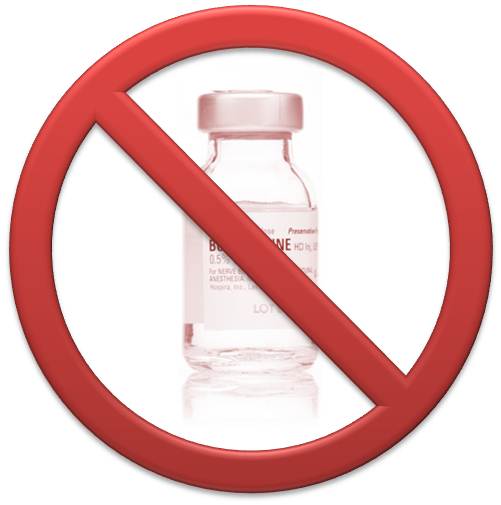AAOS: Numbing Medicine in Knee Shots Toxic to Cartilage
The AAOS just issued a warning about common local anesthetics which can cause severe side effects. About time. In 2007 we conducted a critical experiment in our advanced stem cell lab. Since we wanted to numb up joints before we injected stem cells (as this made it more comfortable for patients) we tested the two most common local anesthetics with mesenchymal stem cells in culture. The result was surprising and dismaying-the local anesthetics killed stem cells quite dead. We repeated this with tiny amounts of anesthetics and again the same result-very dead stem cells. About the same time many key researchers were sounding the alarm that shoulder pain pumps loaded with local anesthetics caused chondrolysis (disintegration of the cartilage) and several big lawsuits were filed. We completely eliminated the worst offender (Bupivicaine) entirely from our practice and no longer stocked the toxic drug and significantly reduced the amount of lidocaine we used. We lectured extensively on these effects to our colleagues, but few at the time were doing anything with stem cells. We have blogged on this several times, sounding the alarm bell that exposing stem cells or any orthopedic tissue to local anesthetics like bupivicaine could damage the tissue. Since then we estimate that literally thousands of orthopedic stem cell procedures and hundreds of thousands of platelet rich plasma injections have been performed with these anesthetics, resulting in harm not only to the cells being injected, but also the cells (cartilage cells) being treated. In addition, likely millions of steroid shots have also been performed with these toxic drugs. I still see patients daily who tell me that they just had a steroid shot a few weeks or months ago.
After all of this, and after sounding the alarm 5 years ago, we’re very happy to see that the American Academy of Orthopedic Surgeons issued a warning last week that local anesthetics are toxic to cartilage. How toxic? The worst drug (bupivicaine), in one recent study killed 99% of cartilage cells in 15 minutes! As we tell all of our patients, do not, under any circumstances let anyone inject bupivicaine into your joints to make a shot more comfortable. How would you know? First, ask the doctor. Second, if your joint goes numb and feels great immediately after the shot, then a local anesthetic was used. In addition, many routine knee surgeries use bupivicaine (also known as Marcaine, Sensorcaine, and Vivacaine) to numb the joint after surgery to reduce post-op pain. What’s really concerning is that AAOS warning states that research has shown that when cartilage is debrided (which is why most knee surgeries are performed), the exposed cartilage is more susceptible to the effects of bupivicaine. Third, if you talk to a doctor who wants to use a local anesthetic with your platelet rich plasma or stem cell injection-run! This is very common in adipose based procedures, where physicians will flood the fat with anesthetic before they take the cells. How can you remain comfortable during the procedure? First, if it’s a diagnostic injection to see if the joint is casing pain (as in the spine), then you may want to have the doctor use dilute lidocaine and avoid bupivicaine. If you’re very pain sensitive, ask for a nerve block or pain medication during the procedure. If you can’t get the procedure done that way, then ask to be put to sleep for a few minutes while the procedure is performed. The upshot? Local anesthetics damage cartilage and knee shot side effects that include damage need to be managed. Regrettably, this stuff is still being used like water!

NOTE: This blog post provides general information to help the reader better understand regenerative medicine, musculoskeletal health, and related subjects. All content provided in this blog, website, or any linked materials, including text, graphics, images, patient profiles, outcomes, and information, are not intended and should not be considered or used as a substitute for medical advice, diagnosis, or treatment. Please always consult with a professional and certified healthcare provider to discuss if a treatment is right for you.

